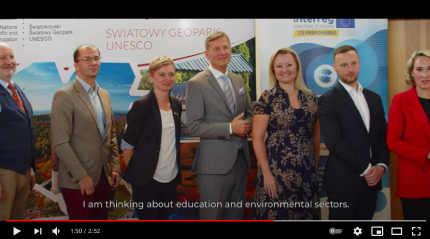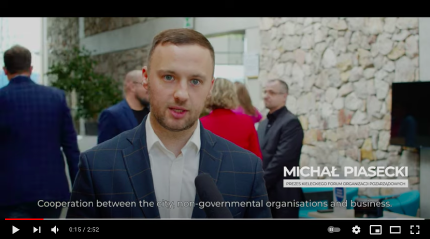Kielce NGOs Congress
Integration and substantive support for the third sector, strengthening dialogue and partnership between NGOs, entrepreneurs and local government, and drawing attention to the need to adapt the City of Kielce to climate change - these are the topics of the Kielce NGOs Congress, which took place on September 4 in Kielce.
The event was attended by 60 participants - NGO activists and volunteers, officials and entrepreneurs. The City of Kielce was represented by the Deputy Mayors - Agata Wojda and Marcin Chłodnicki, Councilor Michał Braun, Deputy Director of the Kielce Technology Park Dominik Kraska and Mirosław Hejduk from the Director of Geonatura Kielce.
The debate was devoted to talking about the city's cooperation with NGOs from various perspectives. The conclusions drawn confirm that it is easier for people who exercise both the executive and the legislative authorities to gain social sensitivity and understand the needs of non-governmental organizations if they were active in the third sector before exercising their mandates and functions. Kielce lacks long-term planning of activities commissioned by cities to organizations. Such planning would facilitate the stability and sustainability of NGO activities and the predictability of results for the city. The established Center of Non-Governmental Organizations is an example of the developing cooperation between the local government of Kielce and NGOs. It was recommended that management staff in local government institutions from the civic sector should be recruited, because it gives tangible results for later perception and understanding of NGOs by persons performing public functions. Work on the long-term plan of cooperation between the City of Kielce and non-governmental organizations should be accelerated and completed, which will result in greater stability for both NGOs and the local government of Kielce. The offer of Centrum NGO should be further developed, which is also becoming the center of local activity in Kielce. Organizations cooperating with business should be used to train subsequent NGOs in this area. As a result, the percentage of organizations that introduce such solutions at home may increase.

In the second part of the event, 3 discussion panels were held.
The subject of the first was external funds, support, problems and needs of NGOs. The lecturer gave statistics on NGOs and the main needs of the organization in the country.
The following conclusions were drawn:
1. Organizations have a problem with finding a suitable cheap premises / office to run their business, which blocks their development
2. Experienced organizations have a problem with professional burnout of leaders and activists. With an aging society, it is difficult to find new, younger people in their place.
3. The transition period between one EU perspective and the next is a difficult time for regular NGO employees, as they face the risk of temporary re-industry due to a lack of financing sources. Much of the NGO staff then leaves the third sector. Own contributions to projects are also an obstacle. 10% of the required own contribution with subsidies of several hundred thousand is an insurmountable barrier for the majority of NGOs.
Recommendations:
1. The solution for organizations looking for a place is the NGO Center space. Promotional activities in this area should be intensified. In particular, reach out to new, just registering entities.
2. It is worth intensifying educational activities in the field of NGO activities in secondary schools and universities. Long-term leaders should look for new areas of public benefit in which they will fulfill themselves. Changing the business environment often helps to generate new energy for action.
3. Organizations need additional training in fundraising from various sources to diversify their funding sources. It is worth introducing the so-called own contribution fund where the local government would cover its own contribution for the NGO, if it would obtain external funding.

The second panel was devoted to cooperation between NGOs and entrepreneurs:
Conclusions:
1. The obstacles in establishing cooperation between business and NGOs are often interpersonal relations, lack of mutual understanding between entrepreneurs and social activists, lack of preparation for talks or looking from the position of strength.
2. Entrepreneurs often do not see any real benefits in implementing CSR. They want to know what exactly the donated funds are going to and what the tangible results are also for the company.
3. Social activists usually look for sponsors for ad hoc activities, and not for multi-stage projects that ensure the stability of the organization's activities
Recommendations:
1. Both parties - both entrepreneurs and NGO activists - must identify their potential partners before they start talking to each other. Getting to know each other well is the key that unlocks many doors. That is why it is worth organizing networking between corporate people and NGO activists. The city, through the Kielce Technology Park, could be a stimulus for such solutions.
2. Community activists must show arguments that are beneficial from the point of view of the sponsor's image, and not only from the perspective of meeting social needs. Perhaps training is needed for the organization, e.g. in negotiations or establishing cooperation.
3. Organizations should forget about the so-called "PAN DA" and start preparing ready-made projects for financing by business, similar to those applied for by public authorities. Showing the real results, phases and marketing benefits for the sponsor may turn out to be decisive in obtaining funds.
The theme of the third panel is the adaptation of the City of Kielce to climate change.
Conclusions:
1. It is too late to repair all the damage caused to nature by man all over the world. Each action in this regard is only to minimize losses.
2. Both the local government of Kielce and social organizations should actively engage in consultations of the act on adapting the city to climate change. As a result, the document will better relate to cities that have similar features to Kielce.
3. In Kielce, "heat islands" have been created as a result of many inaccurate investments in urban space. They adversely affect both the climate and the comfort of life. In order to eliminate them temporarily, financial outlays are needed, and it could be avoided by better planning the space.
Recommendations:
1. It is urgent to educate the public about the consequences of human activity on earth and to stop further erosion of the planet now. Kielce can do it through education, but also through budgetary measures (liquidation of soothed mounds, greening squares, creating new reserves)
2. It is worth organizing in Kielce a series of consultation meetings of the draft act on the adaptation of the city to climate change, open to NGOs and residents, so that everyone can contribute to the final shape of the document
3. Kielce must eliminate heat islands as soon as possible by greening the squares, planting rows of trees along the streets and practically banning logging for road investments. Each subsequent infrastructure project that leaves the town hall must already meet the current climate needs.
Kielce NGOs` Congresse - VIDEO
